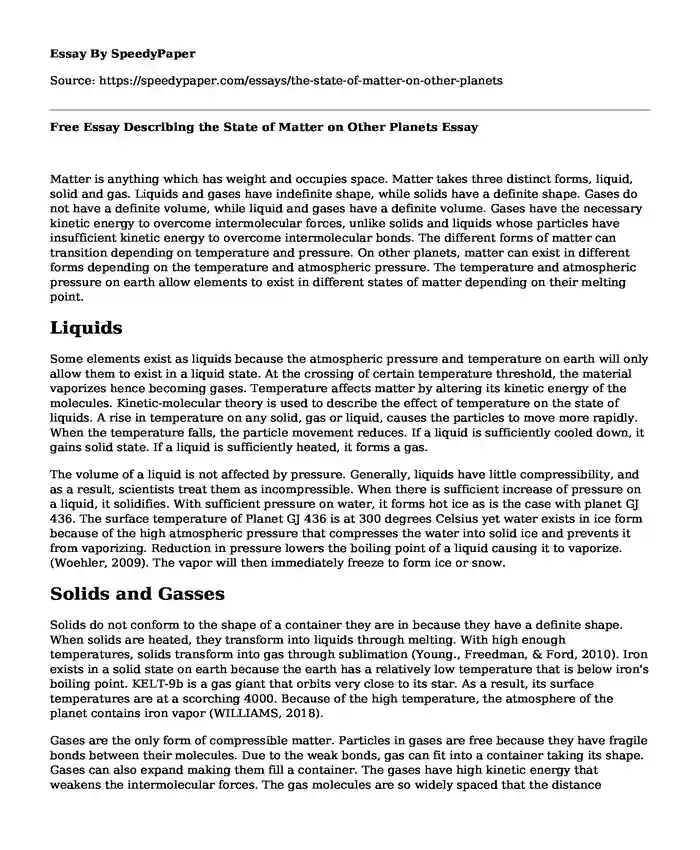Matter is anything which has weight and occupies space. Matter takes three distinct forms, liquid, solid and gas. Liquids and gases have indefinite shape, while solids have a definite shape. Gases do not have a definite volume, while liquid and gases have a definite volume. Gases have the necessary kinetic energy to overcome intermolecular forces, unlike solids and liquids whose particles have insufficient kinetic energy to overcome intermolecular bonds. The different forms of matter can transition depending on temperature and pressure. On other planets, matter can exist in different forms depending on the temperature and atmospheric pressure. The temperature and atmospheric pressure on earth allow elements to exist in different states of matter depending on their melting point.
Liquids
Some elements exist as liquids because the atmospheric pressure and temperature on earth will only allow them to exist in a liquid state. At the crossing of certain temperature threshold, the material vaporizes hence becoming gases. Temperature affects matter by altering its kinetic energy of the molecules. Kinetic-molecular theory is used to describe the effect of temperature on the state of liquids. A rise in temperature on any solid, gas or liquid, causes the particles to move more rapidly. When the temperature falls, the particle movement reduces. If a liquid is sufficiently cooled down, it gains solid state. If a liquid is sufficiently heated, it forms a gas.
The volume of a liquid is not affected by pressure. Generally, liquids have little compressibility, and as a result, scientists treat them as incompressible. When there is sufficient increase of pressure on a liquid, it solidifies. With sufficient pressure on water, it forms hot ice as is the case with planet GJ 436. The surface temperature of Planet GJ 436 is at 300 degrees Celsius yet water exists in ice form because of the high atmospheric pressure that compresses the water into solid ice and prevents it from vaporizing. Reduction in pressure lowers the boiling point of a liquid causing it to vaporize. (Woehler, 2009). The vapor will then immediately freeze to form ice or snow.
Solids and Gasses
Solids do not conform to the shape of a container they are in because they have a definite shape. When solids are heated, they transform into liquids through melting. With high enough temperatures, solids transform into gas through sublimation (Young., Freedman, & Ford, 2010). Iron exists in a solid state on earth because the earth has a relatively low temperature that is below iron's boiling point. KELT-9b is a gas giant that orbits very close to its star. As a result, its surface temperatures are at a scorching 4000. Because of the high temperature, the atmosphere of the planet contains iron vapor (WILLIAMS, 2018).
Gases are the only form of compressible matter. Particles in gases are free because they have fragile bonds between their molecules. Due to the weak bonds, gas can fit into a container taking its shape. Gases can also expand making them fill a container. The gases have high kinetic energy that weakens the intermolecular forces. The gas molecules are so widely spaced that the distance between the particles is bigger than the size of the molecules. When the temperature of a gas is below the critical temperature, it is called vapor, and it can be liquefied using pressure. When vapor is compressed, its boiling point increases causing it to liquefy or solidify (West, 2014). Also, gas can exist in a solid state if the temperatures are below the freezing point of the gas. Oxygen is an example of gas on earth. It exists as gas because earth's surface temperature is above its boiling point while the atmospheric pressure is low. Therefore, it is possible that oxygen exists in a solid state on other planets, but at the moment no such planet has been discovered.
References
WILLIAMS, M. (2018, August 16). This Planet is so Metal. Iron and Titanium Vapour Found in the Atmosphere of an "Ultra-Hot Jupiter." Retrieved from UNIVERSE TODAY: https://www.universetoday.com/139792/this-planet-is-so-metal-iron-and-titanium-vapour-found-in-the-atmosphere-of-an-ultra-hot-jupiter/
West, A. R. (2014). Solid state chemistry and its applications. John Wiley & Sons.
Woehler, K. (2009). The Search for the Meaning of Space, Time, and Matter: Images of Many Travels. Xlibris Corporation.
Young, H., Freedman, R., & Ford, A. (2010). University Physics eBook. Pearson Australia Pty Ltd.
Cite this page
Free Essay Describing the State of Matter on Other Planets. (2022, Jul 12). Retrieved from https://speedypaper.net/essays/the-state-of-matter-on-other-planets
Request Removal
If you are the original author of this essay and no longer wish to have it published on the SpeedyPaper website, please click below to request its removal:
- Free Essay Describing Social Cohesion Example
- Why I have decided to study abroad in France: free essay sample
- Melin Collection - Art Essay Example
- Free Essay on Intelligence: MASINT, OSINT, and HUMINT
- Monarchy Is the Best Form of Government
- Free Essay Sample: The Worst Threats to Humanity
- Free Essay Example. Poor Documentation
Popular categories





